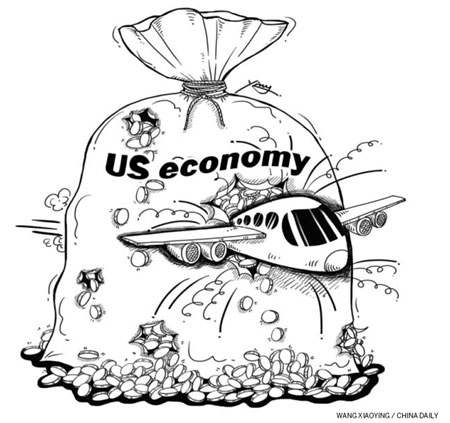The real price of Sept 11 for America

Ten years after the Sept 11, 2001, terrorist attacks on the United States, it is time to look back.
The tragic events - the crashing of two passenger jets hijacked by Al-Qaida terrorists into the World Trade Center, the collapse of the Twin Towers, the crashing of a third plane into the Pentagon, and the failed effort to crash a fourth - continue to retain a powerful hold on public consciousness.
We all remember what we were doing on 9/11, when nearly 3,000 people lost their lives. It was a day that changed the US, and the course of history, in a major way - but not for the better.
Ten years on, Americans are united in remembrance, but deeply divided over US economic and security policies. Most believe terrorists continue to have the ability to launch another major attack on the US and that the wars in Iraq and Afghanistan have increased the risk of terrorism in the US.
Considering the huge costs of the wars, these perceptions should make us pause.
According to a recent CNN poll, the majority of Americans believe that the most important national issue is economy (60 percent), the federal budget deficit (16 percent), and health care (9 percent). Only a fraction believes that the nation's most pressing issue is Iraq, Afghanistan or Libya (5 percent) - or terrorism (3 percent).
After the strong growth of the late 1990s, the technology revolution, and the budget surplus of former US president Bill Clinton's second-term, America was relatively well positioned for the burden of aging demographics and dependency ratios. But these prospects were undermined by the two terms of George W. Bush as US president and 9/11.
By the eve of President Barack Obama's inauguration, the deficit for fiscal year 2009, which began over three months before, had reached $1.4 trillion. At 10 percent of America's GDP, it was the largest deficit relative to the economy since the end of World War II. And if current policies remain in place, US deficits will hover near $1 trillion a year for the next decade.
The events and policies that pushed deficits to these high levels in the short term were, for the most part, not of Obama's making.
The effects of the worst recession since the Great Depression, and the costs of policy actions to fight it, certainly contribute to the diminished prospects of the US economy. But it is the Bush tax cuts and the deficit-financed wars in Iraq and Afghanistan that will account for nearly half of the $20 trillion debt that the US will owe by 2019.
In turn, the stimulus law and financial bailouts will account for less than 10 percent of the debt at that time. In effect, the tax cuts accounted for more than 44 percent of the total.
In politics, timing matters. The first set of Bush tax cuts started in June 2001, only months before 9/11. The second was passed by Congress on May 25, 2003. It was timed only three weeks after Bush gave his "Mission Accomplished" speech on aircraft carrier USS Abraham Lincoln - but before the Iraqi insurgency took off.
The simplest way for the US president and the Congress to begin to stabilize the debt in the coming decade would be to let all of the Bush tax cuts expire on schedule at the end of 2012, and to accelerate the exit strategies from Iraq and Afghanistan. But for political reasons, such measures are not viable.
The US debt is unsustainable in the long run. It is compounded by the fiscal impacts of an aging population and rising health care costs because both will continue to mount.
There was a great global outpouring of sympathy for the US after 9/11. However, as a new Pew survey indicates, many around the world turned against the US as the Bush administration pivoted from Afghanistan to Iraq, and American anti-terrorism efforts expanded.
Widespread anti-Americanism was pervasive in international public opinion throughout the Bush years, before fading significantly following the election of Obama. More recently, the ratings of Obama and the Congress have plunged after the US debt-ceiling debacle and the subsequent downgrading of US sovereign credit rating.
Today, again, perceptions of America and its role in the world are shifting abroad. The global financial crisis has led many to see the financially strapped US as a great power in decline.
The real price of 9/11 is not in the Al-Qaida terrorist attacks. Rather, it is in the massive economic burden that the post-9/11 years will cast over the aging Americans who have lost a substantial part of their savings, over middle-class Americans who are struggling to keep their homes, and over the young Americans whose unemployment will define a generation.
Rarely has a nation hoped for so much as in the fall of 2008, when Obama won the presidential election. And rarely has a nation felt so frustrated as now that much of Obama's political capital has dissolved.
The real legacy of 9/11 will be overcome, but only when America will no longer be divided. As former US president Dwight D. Eisenhower warned in his farewell address in 1961, "this conjunction of an immense military establishment and a large arms industry is new in the American experience".
In the post-9/11 world, the economy was a secondary issue in Washington. In the emerging multipolar world, it should be the national priority.
The author is research director of International Business at the India, China and America Institute, an independent think tank based in the US, and a visiting fellow at Shanghai Institutes for International Studies.



















